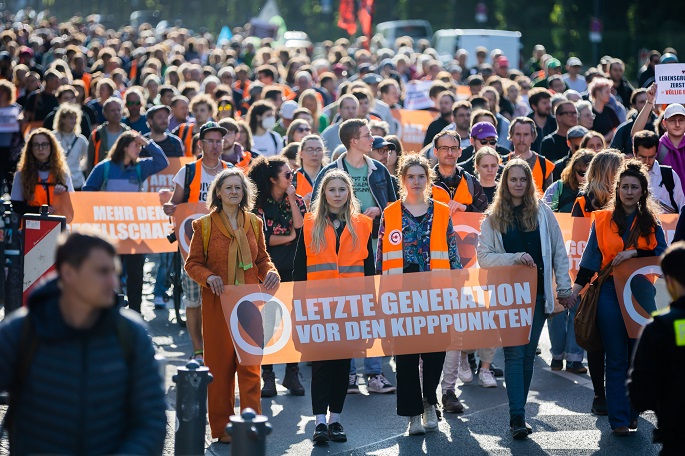Climate activists see surge in support following German raids
Published : 26 May 2023, 00:40
The nationwide raid targeting the Last Generation climate group in Germany sparked a wave of support for the activists, Last Generation said in a statement on Thursday, following a large-scale police operation a day earlier.
Following Wednesday's raid targeting 15 properties affiliated with members of the group in seven German states, the activists called for people to join protest marches in several cities, including Berlin and Munich.
The rally in the German capital drew several hundred people on Wednesday evening, making it the largest to date, Last Generation said.
In the wake of the raids, the group has also received numerous donations, the statement said, adding the group would expand its protests as planned.
"We notice that there is a lot of support coming in. We are growing and we will continue to expand our protest, because we are not doing this for fun," Last Generation activist Raphael Thelen told public broadcaster ARD on Thursday morning.
Police officers and public prosecutor officials targeted properties of the group on Wednesday morning.
The raids were related to numerous criminal charges filed against members of the group since last year, according to the Munich General Public Prosecutor's Office and the Bavarian State Criminal Police Office. Seven suspects between 22 and 38 years old are accused of forming or supporting a criminal organization.
Last Generation, whose members are known for gluing themselves onto roads, has denied having engaged in any criminal activities.
Among other goals, the group demands that the German government come up with a plan to achieve the international goal of limiting global warming to 1.5 degrees Celsius compared to pre-industrial times.
Following Wednesday's raids, a top politician from the country's pro-business Free Democrats (FDP), a coalition partner in Chancellor Olaf Scholz's government, called for more political discussion of climate protection.
Every action by the climate activists would lead to "one more enraged citizen in this country and people are turned against the goal of climate protection," Johannes Vogel, the FDP deputy leader, told ARD on Thursday. That would do a disservice to the cause, he said.
Instead, it was more important to discuss the most effective measures to become climate-neutral in 22 years, Vogel said.
Germany's goal is to reduce its greenhouse gas emissions by 65% by 2030 compared to 1990, and be climate neutral by 2045, which entails not emitting more greenhouse gasses than can be stored again.
German Transport Minister Volker Wissing, also from the FDP, met with Last Generation representatives to discuss climate protection at the beginning of May. According to the group, a further meeting has been scheduled.
The leader of Germany's main opposition party, Friedrich Merz, however, on Thursday ruled out a meeting with the activists.
"No, I will certainly not do that. And the example of Mr Wissing shows me that it is completely pointless," Merz told broadcaster RTL/ntv.
"These are criminals and not interlocutors," the conservative politician stressed.
It was right for the police and the public prosecutor's office to take consistent action against the climate protection group and those who finance them, he said separately on Twitter.
Meanwhile concern was also voiced by Scholz's Social Democrats (SPD) regarding whether Last Generation's actions would achieve much to help the fight against climate change.
SPD General Secretary Kevin Kühnert told the Podimo podcast produced by dpa that while he took people very seriously who consciously break the rules for a cause and accept the consequences. After many months of activism, he would advise people to "just take stock" and see what has changed in society.
The question is whether people with an average income and housing situation now look differently at their car, their house, their consumption and are prepared to make changes, Kühnert said. "And I just can't see that."


